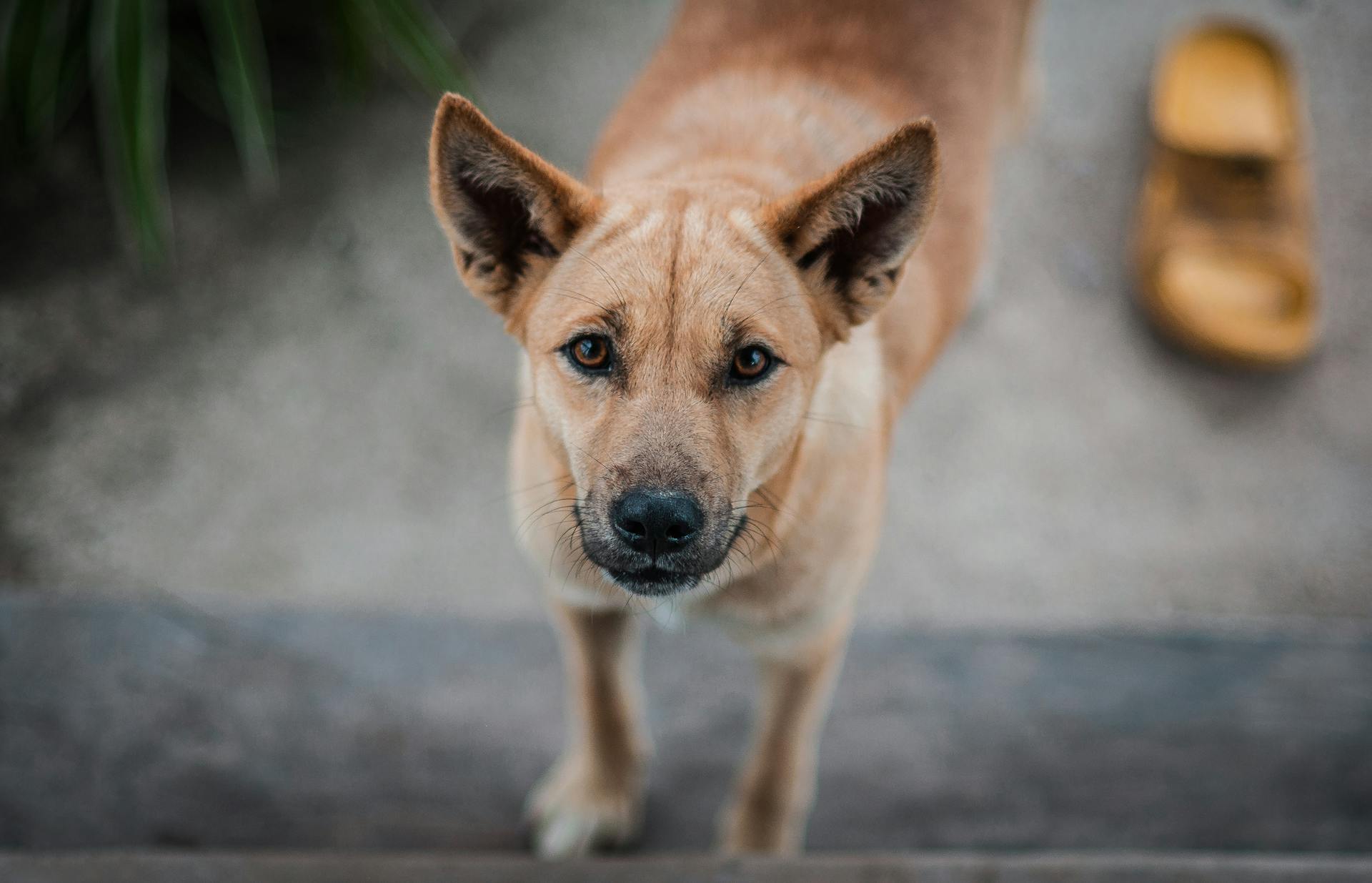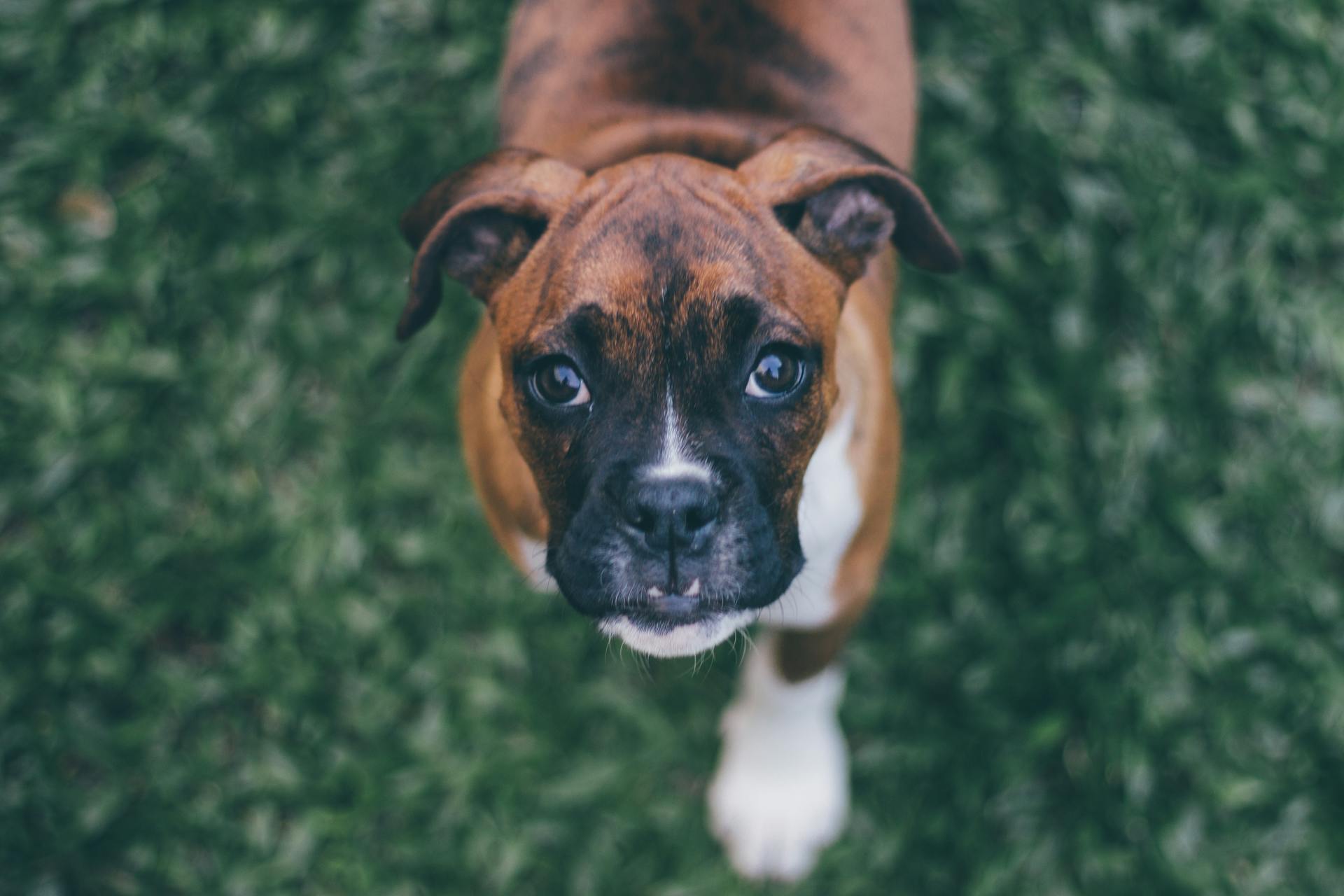
The Boxweiler is a cross between a Rottweiler and a Boxer, and it's a breed that's gaining popularity fast. This mix of two powerful breeds results in a dog that's intelligent, loyal, and energetic.
The Boxweiler's weight can range from 60 to 90 pounds, making it a medium to large-sized dog. Their height can reach up to 24 inches, with a muscular build that's perfect for active families.
As a hybrid breed, the Boxweiler's temperament is often a combination of its parent breeds' traits. They're known to be friendly, outgoing, and affectionate, making them great family pets.
What is a Boxweiler?
A Boxweiler is a mix of two popular German dog breeds, the playful Boxer and the powerful Rottweiler.
Both its parents were bred as herders and hunters, but nowadays, they serve as good guard dogs or as police dogs.
The Boxweiler has been bred for over 40 years in the US.
It's not recognized by the American Kennel Club (AKC) as a separate breed.
However, if it's necessary to establish its lineage, a Boxweiler is recognized by the Dog Registry Of America.
Worth a look: Boxer Breed Origin
Boxweiler Characteristics
The Boxweiler is a wonderful breed, and one of its best qualities is its kind nature. They are loving companions who will always be there for you.
One of the most notable characteristics of the Boxweiler is its watchful and protective side. This can be beneficial in certain situations, such as when there's an aggressive dog attacking. However, it's essential to socialize your Boxweiler well to prevent unwanted aggression towards others.
Here are some key characteristics of the Boxweiler:
- Kind
- Loving
- Watchful
- Protective
- Playful
- Aloof
- Hard worker
- Affectionate
Boxweiler Temperament & Intelligence
Boxweilers are a happy mix of two intelligent breeds, making them generally good-natured and loving companions.
Their temperament is a result of inheriting traits from both the Rottweiler and Boxer parents, which can make them either disciplined and aggressive or more playful and social.
Boxweilers are known to be kind, loving, watchful, protective, playful, and aloof, making them great companions for active families.
They are also hard workers and affectionate, which is a great combination for a family pet.
If you're wondering about their protective nature, it's true that they can be wary of strangers, but with proper socialization, they can learn to be friendly and welcoming.
In fact, early socialization is crucial in developing a great personality for Boxweilers, and introducing them to new sights and smells will make them more adaptive and less wary.
Here are some key personality traits of Boxweilers:
- Kind
- Loving
- Watchful
- Protective
- Playful
- Aloof
- Hard worker
- Affectionate
As a family pet, Boxweilers are great with older kids who know how to handle big dogs, but adult supervision is always recommended when it comes to smaller kids to avoid accidents.
The Boxweiler
The Boxweiler is a unique breed that's a mix of a Boxer and a Rottweiler. It's also known by several other names, including Boxer Rottweiler mix, Rottweiler Boxer mix, Box Rottie, and Boxer Rottie. The name "Boxweiler" actually comes from Weiler Germany!
If you're looking to adopt a Boxweiler, you might be able to find one in a shelter or through a breed-specific rescue. However, be aware that reputable breeders are a better option to ensure you're getting a healthy puppy.
Boxweilers are prone to serious health problems, which can lead to higher veterinary costs throughout their lifetime.
Consider reading: Red Doberman Rottweiler Mix
Health and Care
As a Rottie Boxer owner, it's essential to be aware of the potential health issues that can affect your furry friend. Regular checking and cleaning of their ears can help prevent frequent ear infections, which are common in Boxweilers.
Dental issues are also a concern, and regular teeth brushing can help prevent problems with your dog's teeth and gums. You should also keep an eye out for signs of dental issues, such as bad breath or yellowing teeth.
Some serious health conditions to watch out for include hip dysplasia, bone cancer, and heart conditions. These conditions can be painful and debilitating, and in some cases, may require surgery or medication to manage.
Here are some potential health issues to be aware of in your Rottie Boxer:
- Hypothyroidism
- Lower eyelid droop
- Cataracts
- Allergies
- Bowel disease
- Corneal erosion
In addition to these conditions, it's also essential to keep your Rottie Boxer's coat clean and well-groomed to prevent skin issues like mange and allergies. Regular brushing and grooming can help maintain their overall health and well-being.
Canine Hip Dysplasia
Canine Hip Dysplasia is a degenerative disease that affects large dogs, including the Boxweiler. It's often genetic in nature or caused by being overweight. This happens when the ball and socket of the hip or joints are rubbing and grinding together instead of gliding smoothly.
Common manifestations of hip dysplasia include lameness in their gait, difficulty in jumping or running, and pain. Regular exercise and a healthy weight can help prevent or slow down the progression of this condition.
Hip dysplasia is a painful and often debilitating condition that can affect Boxweilers and is one of the health issues they're prone to. If it becomes too painful, surgery may be required.
Here are some common health issues that can affect your Boxweiler, including hip dysplasia:
- Hip dysplasia
- Bone cancer
- Heart disease
- Bloat or stomach dilatation
- Irregular heartbeat
- Spinal cord disease
- Brain tumors
Mix Care
Boxer Rottweiler mixes need moderate grooming to stay clean and well-taken care of.
Their coats require regular brushing to prevent matting and tangling, but they shed a lot, especially during seasonal changes.
Daily brushing sessions can help reduce shedding and prevent hair from getting everywhere.
Boxer Rottweilers need regular nail trimming to prevent overgrowth, which can be painful and cause health issues.
Their ears should be checked and cleaned regularly to prevent infections.
A balanced diet and plenty of exercise are essential for maintaining their overall health and well-being.
To Drool or Not
As a Boxweiler owner, you might notice your furry friend drooling a lot, especially if they take after their Rottweiler parent. This is due to their big heads and loose upper lips.
Designating a specific area in your house for your Boxweiler to drink from can greatly reduce the number of drool spots around the house.
Exercise and Training
Exercise is key for a happy and well-behaved Rottie Boxer. They need at least an hour of exercise daily to burn off their high energy levels.
A bored and depressed Rottie Boxer mix can be a destructive force, so make sure to provide plenty of physical and mental stimulation. This can include activities like chasing a ball or stick in the yard.
Training is also crucial, as Boxweilers are highly intelligent and can be trained with ease. However, they can be stubborn at times, so it's essential to be persistent and firm with your commands.
Mix Exercise
A well-behaved and balanced Boxweiler needs at least an hour of exercise daily.
The energy levels for the Boxweiler are high, making it best for active families.
A bored and depressed Boxweiler will be a hurricane of destruction in and around the house.
You should give your Boxweiler at least an hour of exercise along with 10-15 minutes of training to keep them happy and obedient.
Allowing your Boxweiler out into the yard and giving them time to chase a ball or stick is also essential.
Trainability
Boxer Rottweiler mixes are highly intelligent dogs, thanks to the high intelligence trait from Rottweilers. This means they can be trained with ease.
However, they can be stubborn at times, so it's essential to be persistent and firm with your commands. You should show who's the boss and give positive reinforcements to bring out the best in these dogs.
General Information
Boxweilers, also known as Rottie Boxers, are a mix of two popular German dog breeds.
Boxweilers have been bred for over 40 years in the US.
Both its parents, the Boxer and Rottweiler, were originally bred as herders and hunters.
What Is a Boxweiler?
The Boxweiler is a mix of two popular German dog breeds, the playful Boxer and the powerful Rottweiler.
Boxweilers have a long history, being bred for over 40 years in the US.
Both Boxer and Rottweiler parents were bred as herders and hunters, but nowadays, they often serve as good guard dogs or as police dogs.
The Boxweiler's lineage is recognized by the Dog Registry Of America, making it easier to establish its heritage.
Additional reading: Red Rottweiler Golden Retriever Mix
What is a Mixed Breed?
A mixed breed dog is a wonderful companion, and that's because they can make great pets. They can inherit the best traits from both parent breeds.
Mixed breed dogs come in all shapes and sizes, and that's because different breeds can have varying sizes. For example, the Boxer Rotties can stand between 21 and 27 inches tall.
Their size can also affect their weight, as the Boxer Rotties can weigh between 50 to 100 pounds. This makes them a great fit for active families who want a pet that can keep up with them.
Their coat can also vary depending on their parent breeds, and the Boxer Rotties have short and thick coats. Some of them have brown or black coats, while others have brindled coats or white patches.
Their head shape can also be quite distinctive, with a large square head and long snouts. This is because of their Boxer parentage, which can also give them droopy jowls.
Mix Socialization
Socialization is key for a Boxer Rottweiler Mix, and it should start early to ensure your puppy grows into a well-adjusted adult dog.
Socialization is the second most important thing to train your Boxer Rottweiler Mix, so make sure to prioritize it.
Take your puppy out into the city whenever you are out, letting them experience the sounds, smells, and sights, which will help them get used to the strange sounds, smells, and sights they'll encounter in life.
This will prevent them from running away when they hear a strange sound, sight, or smell, and also help them understand how to greet other animals and humans properly.
Worth a look: Great Pyrenees Rottweiler Mix
Meeting different people and animals on daily walks is also crucial for their socialization.
You should not take your puppy to the dog park, as it can be a rough place, and it's not a good idea to expose them to unvaccinated animals.
Teaching your dog fun tricks can promote engagement and boost daily bonding time, which your puppy will look forward to.
Socialization helps your puppy develop a proper temperament and manners in greeting other animals and humans.
Sources
- https://www.dailypaws.com/most-popular-rottweiler-mixes-7494158
- https://www.dogster.com/dog-breeds/boxweiler
- https://www.hepper.com/rottweiler-boxer-mix/
- https://www.labrottie.com/the-boxweiler-a-rottweiler-boxer-mix/
- https://www.thegoodypet.com/boxer-rottweiler-mix-your-complete-breed-guide-to-the-boxweiler
Featured Images: pexels.com


